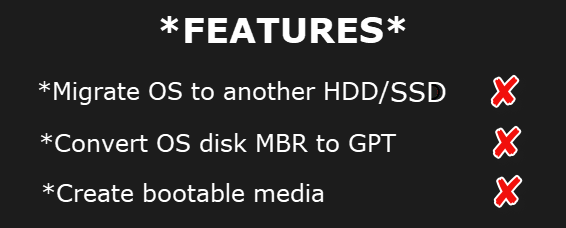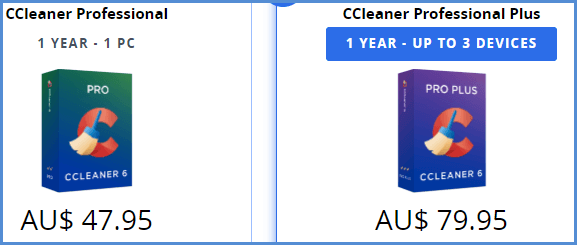Very recently, we published an article discussing the Best Free Partition Managers, and during my research for that article, I noticed a somewhat alarming pattern, which, when thinking about it later, I realized was something I’d come across previously.
This applies to software that is part of a freemium model – that is, software with both free and Premium versions available.
The Missing Features Scam
What software vendors are doing is listing Premium features in the free version’s interface and sometimes also in the free version’s description. Then, when the user clicks on one of those advanced features in the free version, instead of the feature initiating, a message pops up informing the user that the feature is only available in the Premium version, or that there is some crippling limitation in the free version that can only be eliminated by purchasing the Premium version.
And, of course, this generally involves the most desirable/advanced features.
I’ve long advocated that many free versions are used as a tool by vendors to encourage users to upgrade to the Premium version, often including persistent nags to do so. Now, following my recent experience, I think it’s fair to also include these “ghost” features in the sneaky tactics department.
The Subscription Model Ripoff
Lifetime licenses for Premium/Pro software have become as scarce as rocking horse manure, with annual subscriptions fast becoming the norm, and even monthly subscriptions in some cases.
Very few types of software require ongoing development, with the obvious exception being security-related software, which does require ongoing research and development in order to keep up with the ever-changing threat landscape.
And, with the advent of Windows 10 and 11, even compatibility issues are no longer a critical consideration for developers. With annual subscriptions, the user never actually owns the software, but rather they are leasing it year by year.
I can appreciate that software vendors need to make a profit, and lifetime licenses might cause the occasional drop-off in revenue, but there has to be a more equitable system. In my opinion, 3- 5 year licenses at a reasonable price would be fair for both vendors and consumers alike.
I do not own any software that requires an annual subscription; it’s either lifetime or free for me, but I would certainly consider a 3- 5 year license at a reasonable price.
Software Monopolies – Who Owns What
One only has to look at Avast’s history to understand the complexities of acquisitions and the confusion surrounding who owns what:
- 1995: Avast produced the first antivirus software for Windows
- 2016: Avast acquired AVG, arguably its fiercest competitor
- 2017: Avast acquired Piriform, the developer of CCleaner
- 2021: Avast was acquired by Norton LifeLock, which then changed its name to Gen Digital
This is just one example of many similar complex ownership stories. We also have situations where parent companies are selling very similar versions of software under multiple different company names, seemingly in direct competition with themselves.
To me, this smacks of anti-competition. Let us know your thoughts via the comments.
—




If I can’t purchase a lifetime license, I don’t want the software.
Yes Jim, I to prefer to own the software if I can see a need for it. Find that 3- 5 year licenses may only apply to only one copy so I avoid this marketing ripoff, Mindblower!
Thanks Jim
Totally agree. I hate subscriptions. I have one and that is to Norton Security because I don’t fully trust Microsoft’s built-in solution like I don’t trust most things Microsoft. I follow a security channel that tests the built in Windows Security and it consistently fails to catch some of the real nasties whereas I have yet to ever be let down by Norton. I am a cautious “WebSurfer” but have still been caught out by drive-by attacks on otherwise legit websites and saved by Norton. I buy Norton 5 packs in bulk when they are available cheaply for several machines and I currently have about 5 years worth of protection on the shelf !
In fact in typing this I realised I did tell a lie – on this main machine I also have a subscription version of Macrium for my main PC where I keep all my vital info backed up. ALso every so often I also re-subscribe to the Professional version of Privazer which can be installed on an unlimited number of machines. It generously allows you to lapse your professional registration – the only difference being that you then have to download the notified updates manually rather than automatically once your subscription runs out. But you aren’t forced to re-subscribe to get and install the updates hence my loyalty to the company and this software really cleans up your PC safely. On the other machinese I do still run the free version of Macrium that is downloadable from various sites and still does the job for those machines and hasn’t been broken by Windows as yet.
I am sure anti-competition is a thing out there in software land – but then so are a wide variety of other products we buy – a lot of our food is all produced under one company keeping different names for individual products as well as things such as car parts and you name it – all made in the same Chinese factory probably. Our Corporate Overlords will have their subsidiaries !
Off topic – I am sure you remember the “Mars Bar”s as a kid. You could give someone concussion if you hit them in the head with one. Now they are about the same size and weight as a former Milky Way. That’s shrinkflation for you too. Perhaps software subscriptions will drop to six rather than twelve months soon in the chase for the almighty dollar !
Cheers
Reg
“Shrinkflation”, I like it!
I don’t like software licensed to only one computer either. I usually have at least a desktop and a laptop. Sometimes more than one laptop. It’s pretty hard to use more than one at a time, but being able to have that software on whichever computer I decide to use at the moment should be my right for having paid for the software.
Good point Steve. For home users I agree. It’s one of the reasons I always go for portable versions whenever possible.
Hi Jim, To elaborate a bit on your tips: yes, as a longtime user of “freeware,” I have also seen the growing trend of big software companies’ using free editions to promote their paid versions, often displaying features that can only be unlocked in the paid versions. It seems like they all do it now. As a result of this, I make it a practice to only purchase “lifetime” licenses of the programs I do buy (with the exception of the Bitdefender Security suite I use, which has some issues of its own).
But the 2 things I watch out for are, first, whose lifetime is that type license good for? You might think it’s your lifetime, but that’s not always the case. I’ve used software in the past that was only good for the lifetime of the machine it’s installed on. When I upgraded to a new computer, I was unable to transfer the programs to my new machine. Here’s where purchasing a multiple PC license (the more, the better) is probably a better investment.
The 2nd thing is how much data is that program, free or paid, collecting? Yes, most applications need to collect some telemetry to correct for problems and stay current. But many times, the amount of harvested data is excessive and provides more income for the developer than you might think. (Can you say “Windows”?)
‘Just some food for thought and possibly topics for more discussion. I’d love to hear your and your readers’ thoughts on these matters. Regards, tonsis.amicus
Hello tonsis. Did you contact the company and ask if they could reset the license key? I contacted Digiarty Software several times as I replaced my outdated computers and came through. They make video converters. Mindblower!
Hello Mindblower, Yes, in two cases, some years ago, with AOMEI Backupper and EaseUS Todo Backup and Recovery. When I changed my primary PC, I first uninstalled each program and made copies of the original installers. In each new installation, the programs refused to accept my license key, so I contacted the customer service departments of each company. AOMEI’s rep at first said I could not use it on a different computer. When I pressed the issue (such as asking to be connected to the representative’s supervisor), he kept me on hold for quite a while (probably to review my telemetry records), and finally said they would make a one-time exception and allow it. With EaseUS, they flat-out refused to honor my license, despite my threats to never use their software again. Apparently, they’re a big enough company to afford to lose me as a customer. So this was a few years ago, and I can’t speak to what each company’s current policies might be, but I would certainly check first before doing business with either outfit. This leads to a couple of points I would like to make: Don’t be passive when dealing with customer service reps; keep it friendly but firm, and be willing to ask that you be connected to somebody with more authority. Second, check the company policies before you buy.
These experiences have only kindled my love of freeware, or small developers’ software (such as PrivaZer, which I support when I can.).
I’m happy to hear that Digarty has treated you well; I’ll make a point of checking out their programs.
Which leads to my last point: “Word of Mouth” is the biggest power we, as users, have, and small and smart developers know that. Let’s use it when we can. With regards, tonsis
I don’t mind paying depending on how useful and reliable the software is. Some smaller developers rely on this.
I dislike when software is dishonest. I remember years ago downloading AV software which would claim to be free but when it found stuff you would find it would need you to pay to remove. Some of the bad ones would even infect your device first.
I also wish companies would stop with their different tiers like a car wash. AVs are bad at doing this e.g. basic, pro, pro extra, ultra etc.
I also try to only use software that has a perpetual license, when Acronis went to a subscription only model, I left it for Macrium Reflect. Acronis later allowed previous owners of a perpetual license to upgrade to new perpetual licenses. When Macrium decided to go subscription only, I ended up going back to Acronis.
Software coders are just trying to make a living, like the rest of us. If they can’t sell their software, they’ll either make it cheaper or move on to something else. What I don’t like is paying a lot for a program I will only use once or twice in the year that I buy it, such as a partitioning software or data recovery. There are almost always free options. But, they don’t come with support. When you pay for software, part of what you’re paying for is help you may need if something goes wrong. If you’re subject to Murphy’s Law, pay for the software and don’t look back.